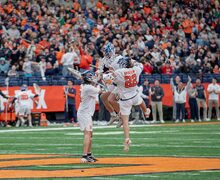Clinton Foundation president, SU alumna discusses higher education issues
Courtesy of Steve Sartori
Donna Shalala speaks after receiving the George Arents Award, the highest Syracuse University alumni honor. Shalala returned to SU on Friday to talk about ethical leadership in higher education.
Donna Shalala’s illustrious career in higher education and government leadership all started with a college boyfriend.
“I came to Syracuse because I was following my boyfriend,” Shalala said. “He hated it and I loved it, so I stuck around and got a PhD. He went off to do other things, never to be heard from again.”
Shalala’s passion for social sciences and diversity standards was instilled in part during her time at Syracuse University, where she earned her doctorate from the Maxwell School of Citizenship and Public Affairs in 1970.
Shalala, the president of the Clinton Foundation and the longest-serving United States Secretary of Health and Human Services under former President Bill Clinton, returned to SU to speak at Maxwell Auditorium on Friday afternoon. More than 200 people crowded even the floor and aisles of the auditorium to hear her Tanner Series lecture entitled “Ethical Leadership In Higher Education: Who Wants This Job Anymore?”
Chancellor Kent Syverud spoke to welcome Shalala back to “her school,” saying no higher education leader has been more helpful to SU than Shalala, who has also served as president of Hunter College, chancellor of the University of Wisconsin-Madison and president of the University of Miami.
“If the question is ‘who wants this job anymore,’ I do because I’m at Syracuse and we have alumni like (Donna Shalala),” Syverud said.
Shalala said she left the Maxwell School determined to be a journalist but found that no one was hiring. Her first experiences working in higher education came when she spent time working at Columbia University before hearing of a presidency opening at Hunter College.
“I interviewed for it, had not a clue what I was doing, and I got my first college presidency,” Shalala said.
She served as president of Hunter College from 1980-88, before leading the University of Wisconsin-Madison as chancellor for five years.
Shalala discussed her efforts in student diversity standards during her time at the University of Wisconsin-Madison, particularly in regards to Native American students who weren’t thriving at the school despite having the support system the university provided for underserved students.
A breakthrough came when university officials realized Native Americans often culturally don’t want to ask for help when they need it, Shalala said. Officials hired a Native American counselor and dean with whom the students could develop close relationships, which dramatically increased retention.
Shalala said many universities may try to increase diversity by providing scholarships or general support groups, but that this is not enough. Support needs to be deepened, she said, and faculty members have to change their attitudes in the classroom to learn how to work with multiethnic populations.
“You can’t give the old lecture that’s so ethnocentric and assume that everybody in the classroom — even if they were born in the United States — is hearing it the same way,” Shalala said. “It’s not as easy as it was. Higher education just is not all white male anymore, thank god.”
Shalala also discussed the importance of making long-term investments in the careers of diverse faculty members who can advance the school.
“You can’t have a world-class university without having diversity because those different points of view enhance the quality of the institution,” she said.
In her time as the president of the University of Miami from 2001-14, Shalala said she faced an underappreciated institution that needed a tough strategy of excellence. She said she created a fundraising campaign, raised $1 billion, hired the right people, stuck to a disciplined plan and quickly moved the school into the top ranks.
Shalala said one of the biggest problems then and now in higher education is the overregulation of universities. She said she’s seen the most major universities’ budgets affected by major compliance rules such as those of the NCAA.
She said with her experience in both government and in higher education, more problems can be solved and changes can be made if people who approach leadership are able to re-conceptualize and rethink rather than “throwing on another regulation.”
Published on October 25, 2015 at 10:09 pm
Contact Lydia: lawilson@syr.edu





